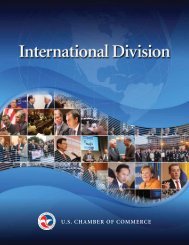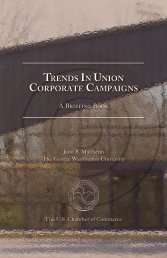[PDF] A Response by the International Organisation of Employers to ...
[PDF] A Response by the International Organisation of Employers to ...
[PDF] A Response by the International Organisation of Employers to ...
- No tags were found...
You also want an ePaper? Increase the reach of your titles
YUMPU automatically turns print PDFs into web optimized ePapers that Google loves.
A <strong>Response</strong> <strong>by</strong> <strong>the</strong> <strong>International</strong> <strong>Organisation</strong> <strong>of</strong> <strong>Employers</strong> 5Background — <strong>International</strong> Labour LawThe globalization <strong>of</strong> employers and <strong>the</strong> corresponding globalization <strong>of</strong> labourorganizations, have placed an added importance on <strong>the</strong> true understanding <strong>of</strong>international law and international labour standards. Unfortunately, <strong>the</strong>re is amisperception <strong>of</strong> what “international law” and “international labour standards” are,and because <strong>of</strong> that misperception, <strong>the</strong>se concepts are frequently misused.“<strong>International</strong> labour standards” and “international law” refer <strong>to</strong> a variety <strong>of</strong>conventions, principles and mechanisms developed <strong>by</strong> international organizations andin particular <strong>the</strong> <strong>International</strong> Labour Organization (“ILO”). These standards exist<strong>to</strong> guide and <strong>to</strong> influence governments in <strong>the</strong> formulation <strong>of</strong> national law and practice.This guidance serves <strong>to</strong> protect <strong>the</strong> basic rights <strong>of</strong> workers, but in a way that takes in<strong>to</strong>consideration <strong>the</strong> unique cultures, traditions and social dialogue <strong>of</strong> each nation thatapplies <strong>the</strong>m. <strong>International</strong> labour standards do not define a uniform path for everynation <strong>to</strong> follow. Ra<strong>the</strong>r, <strong>the</strong>y account for <strong>the</strong> fact that an acceptable approach inone country, may contradict cultural traditions or economic norms in ano<strong>the</strong>r. Thisframework emphasizes <strong>the</strong> fact that <strong>the</strong>re is no singular way <strong>to</strong> do things.Contrary <strong>to</strong> common misconception, international labour standards do not createobligations that directly apply <strong>to</strong> employers. They establish a framework for <strong>the</strong>development <strong>of</strong> laws, and those laws establish a framework for employer behaviour.To <strong>the</strong> extent national law and practice conform <strong>to</strong> international labour standards, anemployer cannot be accused <strong>of</strong> disregarding <strong>the</strong>m. Moreover, no one can justifiablycondemn an employer for operating under a double standard where it complies withnational laws that differ from one country <strong>to</strong> <strong>the</strong> next. Different countries requiredifferent approaches <strong>to</strong> <strong>the</strong> same issue. In <strong>the</strong> end, so long as a nation’s laws fit within<strong>the</strong> parameters defined <strong>by</strong> international labour standards, compliance with those lawsis all that is required.


![[PDF] A Response by the International Organisation of Employers to ...](https://img.yumpu.com/41807569/9/500x640/pdf-a-response-by-the-international-organisation-of-employers-to-.jpg)













